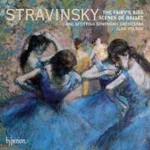
The Fairy's Kiss / Scenes de ballet
 $45.00
Low Stock
add to cart
$45.00
Low Stock
add to cart
STRAVINSKY
The Fairy's Kiss / Scenes de ballet
BBC Scottish Symphony Orchestra / Ilan Volkov
[ Hyperion / CD ]
Release Date: Saturday 1 May 2010
This item is only available to us via Special Import.
"here are striking instances of [Stravinsky's] art of pure delectation...Volkov offers brilliantly clear, high-energy accounts" Sunday Times, 4th April 2010 ***
"In the wrong hands, The Fairy's Kiss can sound prolix when performed without the attendant choreography and scenery, but Volkov has a sure ear for the ballet's momentum, colour and dynamism, and the BBC SSO plays it with precision and eloquent character." The Telegraph, 26th March 2010
"here are striking instances of [Stravinsky's] art of pure delectation...Volkov offers brilliantly clear, high-energy accounts" Sunday Times, 4th April 2010 ***
"Ilan Volkov and his former orchestra continue their survey of Stravinsky's ballets for Hyperion by juxtaposing one of the slightest of his dance scores with one of the most substantial...The BBC Scottish Symphony Orchestra plays wonderfully well for their departed chief conductor" The Guardian, 22nd April 2010 ****
A second disc of Stravinsky's ballet music from the BBC Scottish Symphony Orchestra and Ilan Volkov, this time featuring the composer's fascinating recreation of the music of Tchaikovsky.
Stravinsky's advocation of the-then unfashionable-music of Tchaikovsky was well-known: he was a public champion of the composer over the Russian 'nationalists' such as Rimsky-Korsakov. In 1928, Stravinsky was commissioned by Ida Rubinstein to compose a ballet for her company's season which was based on music by Tchaikovsky. Stravinsky probably envisaged a set of free orchestrations, but the music seems to have taken over and dictated its own terms, with the result that Stravinsky soon found himself entangled in a complex recreative process, and having to compose day and night to get the work completed in time for the first performance, never mind the early deadline. The result-The
Fairy's Kiss-is a complex and highly original masterpiece. As a whole the outcome is wonderfully disconcerting, and brilliantly challenges our perhaps too comfortable way of listening to late romantic music.
Scènes de ballet is in its way another 'recreation'-a ballet 'after Giselle' written for performance on Broadway in 1944. Stravinsky devised a semi-abstract scenario with vague allusions to Giselle among other nineteenth-century ballets; and then proceeded to compose, as it were, 'away from' such models, to the extent that his music constantly suggests their ethos and formulae but always through a neoclassical prism and without direct quotation.
Tracks:
Le Baiser de la Fée
Scènes de ballet



